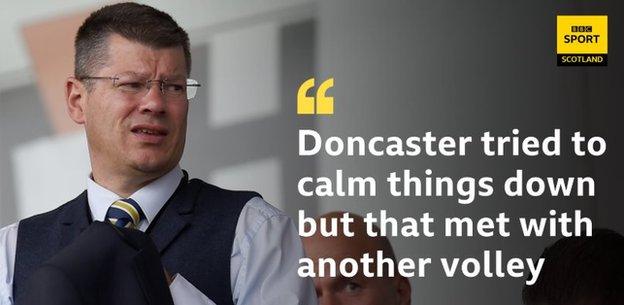'Scottish football's mentality is choking any progress'
- Published

Barry Hearn addressed chairmen, chief executives and managing directors at Hampden in 2014
At the end of a prize fight, two boxers hear a bell and simultaneously raise their arms in triumph, one in hope and one in expectation.
Later, you have a champion pointing at his belt as confirmation of his superiority and you have a beaten man pointing at the champion's bloodied face as confirmation of his moral victory. "I lost, but look at the state of him."
This is where we're at with the SPFL now. Neil Doncaster and his board saw off an opponent on Tuesday, but they suffered some damage in the process.
The chief executive has spoken about a "resounding result" and chairman Murdoch MacLennan has referenced a decision made by an "overwhelming majority". But the fact remains that 13 of the 42 clubs Doncaster represents have serious doubts about what's gone on and want an inquiry into the corporate governance of his regime.
Thirty-one percent is a lot of jabs, a lot of uppercuts, a lot of right hands. It's not enough to put the champ on the canvas, but it's enough to reveal his weakness. And now, it seems, the rival wants a rematch, if Rangers statement is anything to go by.
In victory, Doncaster and MacLennan had adopted a new conciliatory tone, the former talking about "healing divisions" and the latter mentioning that he had taken "careful note of the concerns of the minority", but if an olive branch, of sorts, was extended, it doesn't look like there are many takers right now. "Time is a great healer," said Doncaster. He wouldn't want to be too presumptuous about that.
'Off coast of normality, long way from land'
In recent days and weeks, these are some of the words that have been used by member clubs about the governance of the SPFL and their relationship with the governing body. "Utter shambles". "Farcical". "A distressing lack of confidence and trust in the leadership". "Disingenuous and incompetent". "Arrogant and aggressive". "Outrageous". "Divisive and accusatory". "Disdain and defensiveness". "Selective and patronising". "Singularly failed in its primary duty of care to a member". "A sad indictment of those who govern our game". "The SPFL appears to have taken leave of its senses".
On the other side of the argument the language has been, to use the word of the month, robust. Clubs have been slammed by other clubs for having ulterior motives. Rangers' fabled dossier was rounded on as having "not a shred" of evidence to back up their call for suspensions.
The Ibrox club were said to have a dark agenda which began and ended with null and voiding the season and denying Celtic a ninth title in a row. Hearts, Partick Thistle and Stranraer, three clubs who will now be relegated, were written off as organisations who were only acting in their own self interest.
There's been allegations of threats and counter threats, bullying and counter bullying. Statements were brandished like swords. It's hard to say how many libellous or borderline libellous claims were made in some of these missives, but there were a lot. Lawyers would have been swooning at the thought of getting a piece of the action.

From where we are, cast adrift off the coast of normality, it's a long way back to dry land. Doncaster and MacLennan tried to calm things with their words on Tuesday. "Come on, we've all had a drink, everybody calm down" was the gist of what they were saying, but temperatures are so high now that they were met with another volley.
On Tuesday evening, Rangers went again. "A management culture which not only fears accountability and scrutiny, but which actively campaigns against it is unhealthy and breeds continued mistrust," was the fighting talk from Ibrox. "It is clear that many members have lost confidence in the SPFL leadership and the need for change will not diminish. The status quo cannot hold."
That sounds like a club who are not going to do that Homer Simpson thing of disappearing backwards into a hedge. How can they? To stand down now would be to lose face and to more or less confirm that they weren't as serious about highlighting failings as they said they were. Also, they have gained the support of a dozen other clubs and might feel a moral obligation to them to keep fighting.
'Sizeable support in SPFL realpolitik'
Thirteen clubs is a fair old protest vote in a Scottish football context. Three years ago, Celtic attempted to shine a light on the inner-workings of the Scottish FA by calling for an independent inquiry into "the events that led to the liquidation of Rangers Oldco and the governance issues arising from those events". It was a wholly legitimate call. There were many unanswered questions - and they remain unanswered.
In terms of failing of governance, what Rangers have said about the SPFL in recent weeks, Celtic said about the Scottish FA in 2017. Not as forcefully, for sure. Not with an added demand for the suspension of any staff, that's true. But their case was argued passionately and the episode got extremely bitter at times. Eventually, in part, it led to Stewart Regan's exit from his post as Scottish FA chief executive.
Celtic wanted an investigation into the transparency, accountability and leadership of the association. Whether it was out of a sense of mischief-making against his friends down the corridor at Hampden, a genuine desire for openness, or just a move to keep Celtic onside in the political game, Doncaster backed them.
It's safe to say that Celtic weren't exactly bowled over with the support they got from their fellow clubs. Not many, if any, came out publicly to back the independent review, which fizzled out. This time, 31% of the league have backed it. In the world of realpolitik, that's a sizeable figure and Doncaster will know it.
'Chutzpah needed to make things better'
Scottish football missed an opportunity to examine itself three years ago and it has missed another opportunity now. Strip away the bile and all the inter-club warfare and ask a simple question - can we do better than this? If a neutral party put that to a vote and asked club leaders, players and supporters to respond yes or no, what would the result look like?
Can we do better? The answer, surely, would be an emphatic yes. This is the problem, though. When you try to lift the bonnet to have a look at how things are done, the thing that some want to know first is who's doing the lifting and why? What's their agenda? Who are they acting on behalf of? What are they really trying to do?
That mentality chokes progress. It protects the status quo. Clubs have it in their gift to introduce radical change to the game if they so wish, but they don't want it - or don't want it enough. People like to talk about change, but not many are brave enough to see it through.
Six years ago, Barry Hearn gave an address at Hampden that has gone down in legend. "I'm not an expert on Scottish football," he told his audience of club chairmen, chief executives and managing directors, "and listening to your [financial] figures it doesn't seem like you are either."
That got a nervous laugh from the crowd. Hearn knows about the colour of money. This is a man who once made a success of selling aftershave with pictures of snooker players on the bottle - Eau de Tony Meo, Essence of Terry Griffiths.
"I'm selling out darts arenas for a sport that's not visible to the naked eye," Hearn told them. "I'm saying to the world, 'You need to be involved in this'. I can sell live fishing. Live fishing! I'm good and you're not good enough."
Scottish football would spontaneously combust if the bold Barry was in charge, but some of his chutzpah is desperately needed. "Dress the operation in the clothes of a King even if you're a pauper," he said. "All I can see is a mess. There's no optimism. You're going around looking at your shoelaces and people [broadcasters] are taking advantage.
"The fact that you've got a Scottish Premiership without a sponsor [that is now the situation again], do you know how long you'd work for Barry Hearn if that was the case? You wouldn't have time to take your coat off. You'd be in the car park."
Six years have gone by and the same attitudes prevail now as they did then. Will it be any different in another six years? Once again, strip away the bitterness and ask - can we do better than this? "Sometimes you get stuck up your own backside," said Hearn in his Hampden address. He's right.
So many words have been expended these past weeks, but that line remains the case. Scottish football is still stuck up its own backside.
